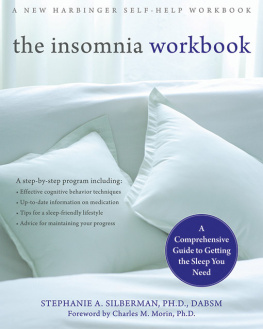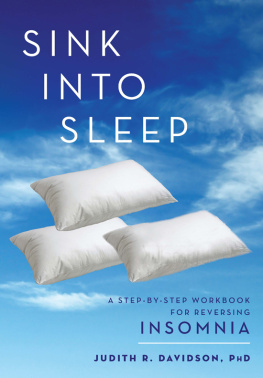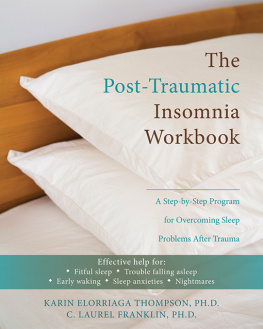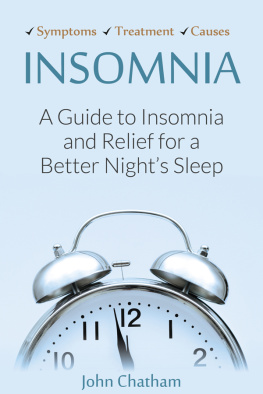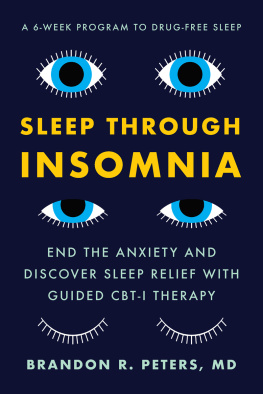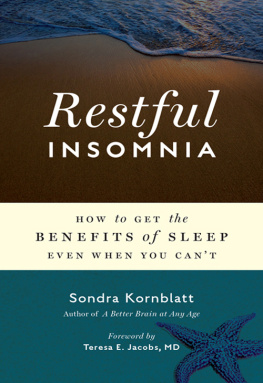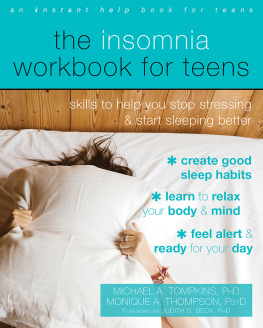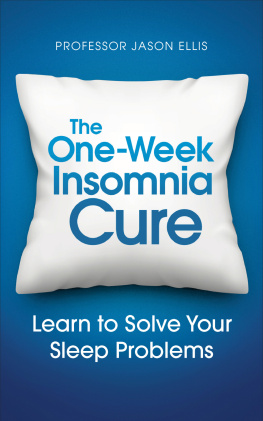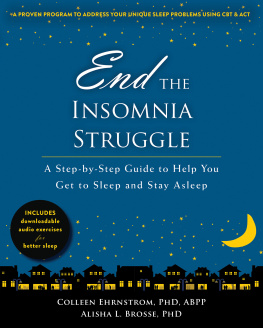Stephanie A. Silberman, Ph.D., DABSM, is a clinical psychologist and board certified sleep medicine specialist who uses cognitive behavioral therapy for the treatment of sleep disorders, depression, and anxiety. She is active in professional organizations and legislative activities affecting psychology and sleep disorders, works as a consultant for various sleep laboratories, and maintains a private practice in the Fort Lauderdale, FL, area.
Foreword writer Charles M. Morin, Ph.D., is professor of psychology and director of the Sleep Research Center at the Universit Laval in Quebec City. He holds a Canada Research Chair on Sleep Disorders and is past president of the Canadian Sleep Society. Morin is associate editor for the journals Sleep and Behavioral Sleep Medicine. He has published four books and more than 150 articles and chapters.
Sleep is one of the few universals of life, and yet we still know little about it. In particular, the reasons we dont sleep can be as mystifying as the reasons we do. The Insomnia Workbook is a comprehensive, scholarly, and clearly written review of what we know about the architecture of sleep, how insomnia disrupts that architecture, and what can be done to rebuild a healthy sleep pattern.
Robert McGrath, Ph.D., director of the Ph.D. program in clinical psychology and director of the MS Program in clinical psychopharmacology at Fairleigh Dickinson University in Teaneck, NJ
Silberman has distinguished herself in the diagnosis and treatment of sleep disorders. There are still far too few dedicated sleep professionals available. Her new book is needed to promote greater understanding of why insomnia is far and away the most common manifestation of underlying sleep disorder and what to do to relieve this distressing condition.
Bruce Nolan, MD, FACP, FAASM, sleep center medical director at Miller School of Medicine, University of Miami
Silberman has taken the difficult topic of insomnia and provided an informative review not only of normal sleep, but also of common sleep problems. She discusses treatments for people having difficulty falling asleep and staying asleep using up-to-date medical and psychological treatments. The book is sure to be of interest to people with trouble sleeping and readers who simply wish to learn more about the fascinating world of sleep.
Glenn R. Singer, MD, FACP, FCCP, FAASM, medical director of the sleep disorder centers at Broward General Medical Center and Weston Broward Health, Fort Lauderdale, FL
The idea of a comprehensive insomnia workbook, starting from the basics of sleep to diagnosis and management, is brilliant. This book is up-to-date and serves as an all you need to know about sleep guide. It is easy to read and understand, keeps the readers attention, and acts like a teaching aid. I would recommend this book to anyone interested in learning about the various intricacies of sleep, and to any professional who requires in-depth information. Silberman has further enriched the world of sleep with her contribution.
Vipin Garg, MD, FCCP, FAASM, director of the sleep disorders center at Trinitas Hospital in Elizabeth, NJ, and assistant professor of medicine at Seton Hall University

Publishers Note
Care has been taken to confirm the accuracy of the information presented and to describe generally accepted practices. However, the authors, editors, and publisher are not responsible for errors or omissions or for any consequences from application of the information in this book and make no warranty, express or implied, with respect to the contents of the publication.
The authors, editors, and publisher have exerted every effort to ensure that any drug selection and dosage set forth in this text are in accordance with current recommendations and practice at the time of publication. However, in view of ongoing research, changes in government regulations, and the constant flow of information relating to drug therapy and drug reactions, the reader is urged to check the package insert for each drug for any change in indications and dosage and for added warnings and precautions. This is particularly important when the recommended agent is a new or infrequently employed drug.
Some drugs and medical devices presented in this publication may have Food and Drug Administration (FDA) clearance for limited use in restricted research settings. It is the responsibility of the health care provider to ascertain the FDA status of each drug or device planned for use in their clinical practice.
Distributed in Canada by Raincoast Books
Copyright 2008 by Stephanie A. Silberman
New Harbinger Publications, Inc.
5674 Shattuck Avenue
Oakland, CA 94609
www.newharbinger.com
Epworth Sleepiness Scale (ESS), 1990-1997 M.W. Johns, reprinted here with permission of M.W. Johns.
DBAS-16, 2007 Charles M. Morin, reprinted here with permission of Charles M. Morin.
All Rights Reserved
Epub ISBN: 9781608825790
Acquired by Jess OBrien; Cover design by Amy Shoup;
Edited by Jasmine Star
Library of Congress Cataloging-in-Publication Data on file with the publisher
This book is dedicated to my husband, Dr. Frank Hull, who encouraged and inspired me to write this book. His own expertise in the area of sleep medicine, along with his passion and dedication to the field, is truly admirable. And to my wonderful sons, Elliot and Trevor, for their love, kisses, and many hugs.
Contents
Acknowledgments
To family and friends who encouraged me throughout this project, thank you for sharing your time and lending your support.
Thank you to my acquisitions editor at New Harbinger Publications, Jess OBrien, for his belief in the value of this book from the beginning, and for helping it come to fruition. Excellent feedback from editors Jess Beebe and Jasmine Star helped to improve the final manuscript.
A special thanks to my parents, Myron and Dr. Teresa Silberman, for showing me the value of education, hard work, kindness, and compassion to others.
Foreword
Almost everyone has experienced an occasional poor nights sleep due to worries, an impending deadline, or a sick child. For at least 10 percent of the adult population, though, insomnia is a chronic and burdensome problem. It is also the most prevalent of all sleep disorders. Although there is a tendency to trivialize or make fun of sleep problems, chronic difficulty sleeping produces daytime fatigue, mood disturbances, and problems with attention and concentration, and it often makes otherwise simple tasks difficult to accomplish. When left untreated, insomnia increases absenteeism from work and heightens the risk of depression.
While there is no doubt that insomnia should be taken seriously, people with sleep problems are often discouraged by the lack of resources available to treat the problem. Of course, we are inundated with advertisements for various sleeping pills. Although they may be useful in the short term under some circumstances, there are risks of habituation and dependency associated with their long-term usage. Over-the-counter medications and natural products, as well as alcohol, should be avoided altogether, since there is no evidence that they work, and they are not without risks. So, what are the treatment options left for those with chronic insomnia?
In this workbook, Dr. Silberman eloquently describes an effective self-help program for overcoming insomnia based on psychological and behavioral principles. Indeed, there is now solid scientific evidence that cognitive behavioral therapy is an effective treatment alternativeif not the treatment of choicefor chronic insomnia. In addition to being safer and often more acceptable to patients, this approach produces longer lasting results than sleep medication. Nonetheless, it remains underutilized by health care providers and is not always readily accessible to those who need it most. The number of sleep clinics has grown tremendously over the past several years, but, unfortunately, few sleep professionals have expertise in offering specialized cognitive behavioral therapy for insomnia.

